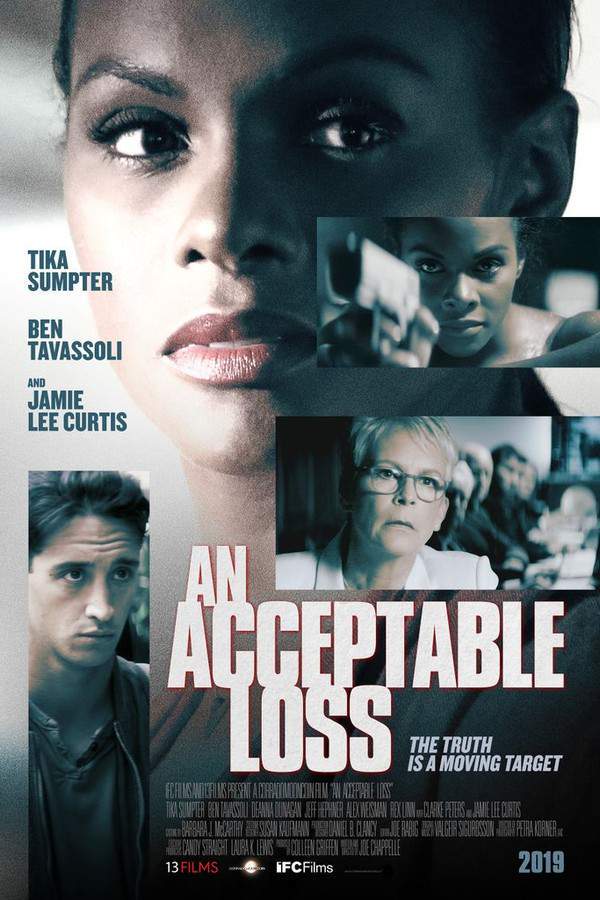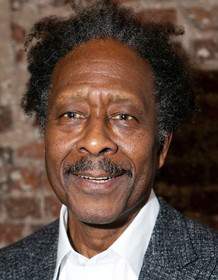An Acceptable Loss 2019

Following a military operation with tragic repercussions, former national security advisor Libby Lamm grapples with her conscience and the weight of her past decisions. Partnering with the mysterious Rachel Burke, she begins to unravel a complex network of lies and cover-ups. As they dig deeper, Libby finds herself facing a critical choice: uphold her loyalty to the government or expose a dangerous truth that could shake the nation to its core.
Does An Acceptable Loss have end credit scenes?
No!
An Acceptable Loss does not have end credit scenes. You can leave when the credits roll.
Meet the Full Cast and Actors of An Acceptable Loss
Explore the complete cast of An Acceptable Loss, including both lead and supporting actors. Learn who plays each character, discover their past roles and achievements, and find out what makes this ensemble cast stand out in the world of film and television.
External Links and Streaming Options
Discover where to watch An Acceptable Loss online, including streaming platforms, rental options, and official sources. Compare reviews, ratings, and in-depth movie information across sites like TMDb, Wikipedia, Rotten Tomatoes or Metacritic.
Ratings and Reviews for An Acceptable Loss
See how An Acceptable Loss is rated across major platforms like IMDb, Metacritic, and TMDb. Compare audience scores and critic reviews to understand where An Acceptable Loss stands among top-rated movies in its genre.

The Movie Echo Score
Overall, An Acceptable Loss delivers commendable lead performances but is undermined by uneven execution. The film’s pacing is measured yet often plodding, and its exposition-heavy dialogue creates confusion rather than intrigue. Production setbacks are evident in its modest visual presentation and occasional narrative lapses, which prevent full engagement. While the central moral questions offer some urgency, the combination of slow development and ambiguous focus yields a mixed impression with limited cohesion.
The Movie Echo Score Breakdown for An Acceptable Loss

Art & Craft
In terms of art and craft, An Acceptable Loss appears constrained by its modest production design and uninspired visual approach. The direction leans toward functionality rather than flair, and the editing rhythm often fails to elevate the tense moments. Lighting and color use remain understated but offer little stylistic distinction. Overall, the technical execution feels serviceable but leaves the film with a lackluster aesthetic identity.

Character & Emotion
When it comes to character and emotion, the film is buoyed by strong lead performances that lend conviction to its moral dilemmas. The primary actors convey believable intensity, capturing the weight of their roles even when dialogue strains. However, secondary characters lack sufficient depth, and emotional stakes sometimes undercut the intended resonance. Ultimately, the compelling portrayals partially offset the uneven character development.

Story & Flow
Regarding story and flow, An Acceptable Loss struggles with uneven pacing and convoluted exposition. The structure relies heavily on flashbacks that disrupt narrative momentum and can leave viewers disoriented. Although the central premise offers political intrigue, the build-up often feels laborious, and key revelations lack the necessary foundation for impact. Consequently, the plot engagement remains inconsistent throughout the runtime.

Sensory Experience
With respect to sensory experience, the film’s audio and visual design falls short of its aspirations. The soundtrack seldom elevates tension, and ambient sound cues feel underdeveloped. Visually, the production opts for functional framing over a distinctive style, contributing to a subdued atmosphere. Overall, the sensory elements provide a competent backdrop but lack memorability.

Rewatch Factor
In terms of rewatch factor, the film offers limited allure for subsequent viewings. The uneven pacing and narrative ambiguities reduce the incentive to revisit the storyline. While thematic questions retain some interest, the lack of stylistic flair and inconsistent tension diminish lasting appeal. As a result, the replay value remains modest, with little fresh insight gained on repeated exposure.

40
Metascore
5.8
User Score


12%
TOMATOMETER

71%
User Score

62
%
User Score
Take the Ultimate An Acceptable Loss Movie Quiz
Challenge your knowledge of An Acceptable Loss with this fun and interactive movie quiz. Test yourself on key plot points, iconic characters, hidden details, and memorable moments to see how well you really know the film.
An Acceptable Loss Quiz: Test your knowledge on the political thriller 'An Acceptable Loss' and its intricate plot twists!
Who is the main character in 'An Acceptable Loss'?
Elizabeth 'Libby' Lamm
Rachel Burke
Adrian
Martin Salhi
Show hint
Full Plot Summary and Ending Explained for An Acceptable Loss
Read the complete plot summary of An Acceptable Loss, including all major events, twists, and the full ending explained in detail. Explore key characters, themes, hidden meanings, and everything you need to understand the story from beginning to end.
As Elizabeth “Libby” Lamm, portrayed by Tika Sumpter, steps into her new role as an adjunct professor of foreign policy at the prestigious Grant University, she faces an ice-cold reception from the academic circle. This chilling welcome can be traced back to her exhilarating but controversial past as the former national security adviser to U.S. Vice President Rachel Burke, played by Jamie Lee Curtis. Her arrival ignites a storm of suspicion among her fellow professors, particularly during an unwelcoming mixer, where her assistant and another colleague confront her about her debated history. An op-ed published by Capital Dispatch regarding her involvement in a U.S. military operation on Homs adds fuel to the fire, intensifying the scrutiny she finds herself under.
Libby’s sense of paranoia becomes increasingly evident as she implements drastic measures to protect her private life. She eschews the conveniences of modern technology such as email, cell phones, and computers, choosing instead to communicate through old-fashioned means. Each night, she secludes herself in her study, where she passionately jots down thoughts and revelations in numerous notebooks, all of which are secured tightly in a vintage safe she unearthed from an antique shop. Her ever-present Glock 17 serves as both a shield and a reminder of her precarious situation, as she navigates her daily life with heightened alertness, sensitive to the faintest noise that disrupts her quiet.
Unknown to Libby, her daily struggles are compounded by the relentless stalking of Martin Salhi, represented by Ben Tavassoli, a withdrawn graduate student at the university who intentionally distances himself from his roommate, Jordan, played by Alex Weisman. Martin’s odd behavior escalates Libby’s discomfort; he begins shadowing her and fabricates a lawn service flyer as a ruse to explore her home. Under the guise of this innocent facade, he breaks in and installs hidden cameras, keeping an intrusive watch over Libby’s every move, particularly as she secures her precious notebooks.
During her usual routines at home, Libby receives an unexpected visit from Adrian, depicted by Jeff Hephner, the chief of staff for the president, who harbors a complicated past with her from his time as a policy adviser at the White House. Their history is charged, and when Adrian pressures Libby to keep quiet about the Homs operation, she steadfastly refuses, sparking a conflict that compels her to dismiss her class prematurely and rush back home.
Upon her return, she is shocked to find Martin attempting to break into her safe. Faced with the unexpected confrontation, Martin finally admits to stalking her, driven by an obsessive need to understand how someone like Libby could participate in the catastrophic Homs attack. His motivations are personal, as he lost family in that same attack and seeks answers.
With her gun raised at Martin, Libby shares snippets from her memoir, which reveals her experiences surrounding the tragic events leading to the Homs strike. The narrative she shares exposes the manipulation and aggression behind the decision-making, which she hopes will ultimately help shed light on the truth.
Flashbacks transport us back four years to the White House situation room, where Libby finds herself advising a critical team of the president, vice president, and key officials on a chilling plan that entails significant implications: a nuclear strike targeting leading figures of dangerous terrorist organizations gathered in Homs. Endorsed vigorously by Vice President Burke, this plan, dubbed Plan 712, disregards Libby’s hesitations and results in an assault resulting in the death of numerous innocents alongside the intended targets.
As Martin absorbs the shocking revelations contained within Libby’s memoir, their already volatile lives are interrupted by an incursion of covert agents. Libby and Martin are forced into a frantic escape, driven by her need to deliver her damning manuscript to her father, Phillip Lamm, portrayed by Clarke Peters, the powerful chief editor of the Springfield Register. With the night thick around them, their search for safety leads them to a beach, only for Martin to awaken to a haunting silence—Libby has vanished, leaving behind a trail of notes that suggest she might have gone into hiding.
Trapped within the gloom of a basement, Libby faces President Burke, who attempts to entice her into a political position as Secretary of State under the condition she suppress the explosive memoir. Yet, Libby stands firm, fully aware that succumbing to the president’s tactics could spell disaster for those entangled in the truth. As the president leaves, instructing her chief of staff to release Libby and to cease surveillance on Martin, tensions remain as Adrian foresees disaster should their overlap with the truth not be managed.
Nevertheless, Libby’s release places her only blocks away from the Springfield Register, where a reunion with Martin and her father is anticipated. However, a sudden bomb blast disrupts their expectations, tragically resulting in 23 fatalities, including Libby, her father, and Martin. The sinister orchestrations of Adrian emerge as the authorities hastily attribute the attack to Martin’s supposed involvement.
In the aftermath, as the FBI investigates the remains of the shattered building, a flicker of hope emerges in the form of an email from Martin, sent just prior to the chaos. It outlines his clever strategy to evade his pursuers by acquiring a burner phone, digitizing the memoir, and anonymously sending it to Jordan, urging him to broadcast the truth far and wide.
Uncover the Details: Timeline, Characters, Themes, and Beyond!

Coming soon on iOS and Android
The Plot Explained Mobile App
From blockbusters to hidden gems — dive into movie stories anytime, anywhere. Save your favorites, discover plots faster, and never miss a twist again.
Sign up to be the first to know when we launch. Your email stays private — always.
Watch Trailers, Clips & Behind-the-Scenes for An Acceptable Loss
Watch official trailers, exclusive clips, cast interviews, and behind-the-scenes footage from An Acceptable Loss. Dive deeper into the making of the film, its standout moments, and key production insights.

Unlock the World of Movies with Our Comprehensive Wiki
Dive into our Movie Wiki for in-depth film encyclopedia entries, including cast biographies, production trivia, plot synopses, behind-the-scenes facts, and thematic analyses. Whether you’re researching iconic directors, exploring genre histories, or discovering hidden easter eggs, our expertly curated movie database has everything you need to fuel your cinematic passion.

Quick Links: Summary, Cast, Ratings, More

What's After the Movie?
Not sure whether to stay after the credits? Find out!
Explore Our Movie Platform
New Movie Releases (2026)
Famous Movie Actors
Top Film Production Studios
Movie Plot Summaries & Endings
Major Movie Awards & Winners
Best Concert Films & Music Documentaries
Movie Collections and Curated Lists
© 2026 What's After the Movie. All rights reserved.




















